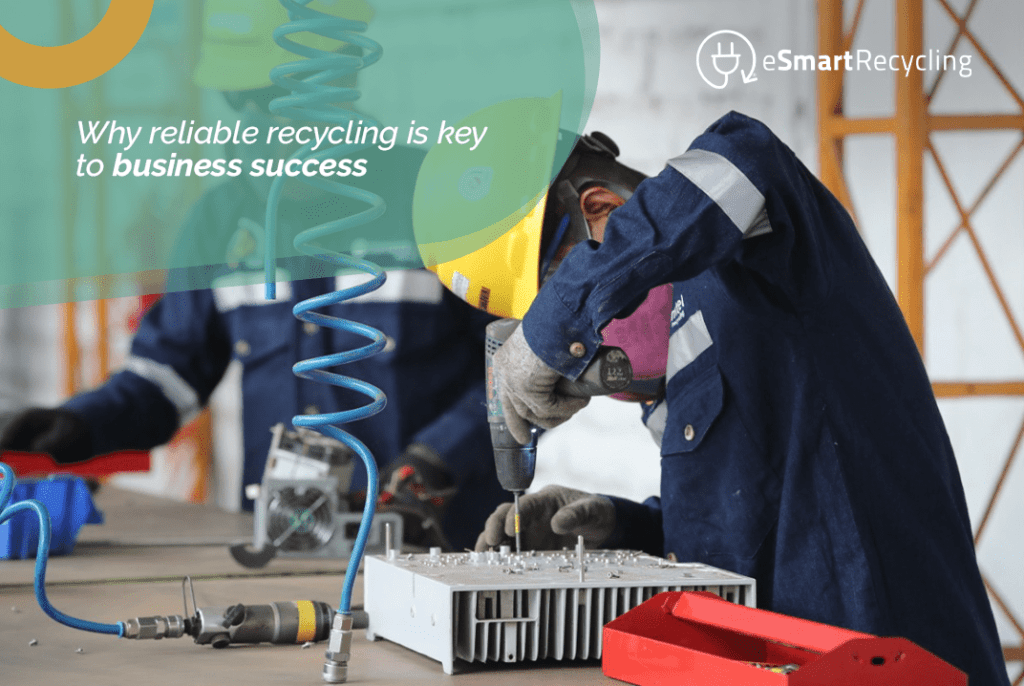
Businesses around the world have realized the importance of establishing operations that are efficient and sustainable. A significant factor in establishing sustainable business practices is reliable recycling. Reliable recycling helps reduce waste and can be a critical factor in a business’s success. This article explores why recycling is crucial for companies and how it can benefit their success.
One of the most important reasons businesses should invest in reliable recycling is the positive environmental impact it can have. As we become more aware of our planet’s long-term ecological issues, recycling is an excellent tool for becoming a more responsible company. Reducing waste can also help businesses save money in the long run, as more waste means higher disposal costs. Reliable recycling can contribute to significant environmental goals, such as reducing energy consumption, increasing the use of renewable energies, and decreasing greenhouse gas emissions. In other words, reliable recycling can help the planet by minimizing waste, energy, and greenhouse gases.
Reliable recycling can be crucial to a company’s branding and public relations. In today’s environmentally conscious world, customers want to see that companies are taking responsibility for the environmental impact of their operations. By participating in reliable recycling, businesses can demonstrate to customers and the public that they are not just paying lip service to environmental stewardship. Engaging in reliable recycling shows a real commitment to sustainable business practices and can help businesses stand out in a saturated market.
Another critical reason businesses should invest in reliable recycling is the potential for cost savings and relationship strengthening. Reliable recycling can help enterprises mitigate rising waste disposal costs and offer cost savings in raw materials and greater operational efficiency. Furthermore, it can help businesses establish closer relationships with their supply chain partners. Many suppliers require their client companies to have effective recycling programs as a condition for continuing to do business. Therefore, having a solid recycling program can be vital for relationships and give businesses an advantage over their rivals in terms of supplier pricing.
Finally, an often-overlooked advantage of reliable recycling is the potential to boost innovation and product development. Many companies are now seeking alternative materials to traditional raw materials to reduce waste and lower production costs. Investing in reliable recycling can be a source of new materials and innovative ideas, which can pave the way for new products and services. Thus, reliable recycling can boost a company’s environmental credentials and help it adopt a more innovative and forward-thinking approach.
Reliable recycling should be an essential consideration for any business. Investing in reliable recycling is good for the environment and can also be necessary for brand image and public relations. Additionally, it has the potential to save costs, improve relationships with supply chain partners, and can also be a source of innovation. Reliable recycling is a great starting point if you’re a business owner looking to improve your environmental credentials and make a positive impact.
More and more companies are starting to implement electronic device recycling programs to reduce their environmental impact and meet their sustainability goals. However, getting employees to participate in e-recycling programs can be quite challenging. In this article, we’ll discuss some strategies to increase employee participation in electronic recycling programs within companies.
The first step to increasing employee participation in e-recycling programs is ensuring that all employees understand the benefits of recycling electronic devices. Recycling is not only good for the environment, but it can also help companies save money, reduce their carbon footprint, and create a positive image for the company. Make sure to explain these benefits in detail to educate employees about the importance of electronic recycling.
Many employees may have concerns about electronic recycling, such as data security and understanding what can and cannot be recycled. Companies need to address these concerns and provide employees with the information they need to feel comfortable participating in the program. For example, companies can create a data security policy, inform employees about the types of devices that can be recycled, and provide electronic recycling bins in common work areas to make participation even easier for employees.
Another way to encourage employee participation in e-recycling programs is to introduce incentives. Incentives can take many different forms, such as discounts on company services or products, time off, or recognition and rewards. These incentives can help employees feel that they are making a difference and can also foster a bit of friendly competition in the office.
The most important step to increasing employee participation in e-recycling programs is to implement a company-wide policy that makes electronic recycling mandatory. This policy can include specific instructions on recycling devices, such as where and how they should be recycled, as well as which types of devices are allowed. Providing clear instructions can help ensure that all employees understand what is expected of them and are more likely to participate.
Implementing an e-recycling program in the company and increasing employee participation can be a challenging task. However, by educating employees about the benefits of e-recycling, addressing common concerns, introducing incentives, and applying a company-wide policy, companies can take steps to ensure their e-recycling program is a success. By making electronic recycling fun and easy for employees, companies can help create a more sustainable work environment and encourage employees to do their part to help protect the environment.
Electronic waste is a significant issue in the modern world. Many Americans use electronic devices, which become obsolete within a few years, contributing to the enormous problem of electronic waste. This e-waste can have severe effects on human health and the environment, as well as added costs for businesses. So, what can companies do to reduce the amount of electronic waste they generate?
In this guide, we will explore practical strategies for reducing electronic waste in your business, including tips for recycling, reusing, and prolonging the life of your electronic devices. We will also discuss the potential advantages of reducing electronic waste in your organization and look at some real-life examples of companies that have made significant progress in this area.
Electronic waste, or e-waste, refers to all unwanted and obsolete electronic products, such as computers, monitors, televisions, audio and video equipment, and phones. E-waste contains harmful substances like lead, barium, and brominated flame retardants, which can have serious health and environmental consequences.
In addition to these health issues, electronic waste can be costly for organizations. In many cases, companies have to pay for the safe disposal of their e-waste, so it makes good business sense to take steps to reduce the amount of electronic waste they generate.
There are several strategies that businesses can employ to reduce the amount of electronic waste they generate. Some of these strategies include:
This can help ensure that your organization only buys the electronic devices it needs and does so in an environmentally friendly manner.
Regularly updating IT equipment can help ensure that devices don’t become obsolete, reducing the amount of electronic waste your organization generates.
This can help ensure that valuable materials from electronic devices are recovered and reused, contributing to reducing the environmental impact of creating new devices.
Prolonging the life of electronic devices can be a cost-effective way to reduce electronic waste by keeping devices in use longer before replacing them.
Reducing the amount of electronic waste generated in your business has several benefits. In addition to reducing the impact on health and the environment, the cost savings associated with reducing electronic waste can be significant. For example, Dell estimates that its Asset Recovery Services program has saved it around $50 million annually.
Reducing electronic waste can also help a company’s image, as customers are increasingly aware of the environmental footprint of the products they use. Taking steps to reduce electronic waste can help ensure that the public sees companies as environmentally responsible organizations.
Many companies have taken significant steps to reduce the amount of electronic waste they generate. One example is Best Buy, which has implemented a program that has helped it recycle more than 2.5 billion pounds of electronic waste over the past decade. Another example is HP, whose Sustainable Impact program has helped it recycle over 1.1 billion pounds of electronic waste.
Electronic waste is a significant problem in the modern world and can have severe consequences for health and the environment. However, there are several practical strategies that businesses can employ to reduce the amount of electronic waste they generate. These strategies can result in significant cost savings and a more positive image for the organization. Real-world examples like Best Buy and HP also demonstrate that companies can take steps to reduce the amount of electronic waste they generate.
With the rise of the digital era, the electronic devices we use daily are increasingly made from electronic waste materials. The explosion of the Internet of Things (IoT) and wireless mobile devices has changed how we interact with the world around us. Consequently, the demand for electronic waste recycling has significantly increased, and many companies are entering this field. But is electronic waste recycling profitable?
This article will cover some fundamental concepts and underlying notions about electronic waste recycling. We aim to examine the role of electronic waste recycling in a company’s bottom line and how it can be used to significantly reduce the number of discarded products through proper recycling methods.
Electronic waste, or e-waste, refers to any electronic equipment that is obsolete or no longer in use. This can include computers, televisions, mobile phones, VHS and DVD players, e-readers, printers, and other devices. Electronic waste recycling is the process of recovering valuable and reusable materials from electronic devices. This concept is becoming increasingly important as electronic product disposal rates rise with advances in nanotechnology and higher levels of electronic technology.
The benefits of electronic waste recycling cannot be underestimated. While many people and businesses may consider electronic waste a burden, recycling it can significantly reduce the financial costs of purchasing new devices and help increase the value of electronic equipment. Additionally, reducing the total volume of discarded electronic devices protects the environment from the ecological impact of electronic waste materials.
Furthermore, electronic waste recycling programs offer economic benefits. For instance, many companies today seek to reduce expenses, and electronic waste recycling provides a cost-effective means to achieve this goal. The materials collected from electronic waste, such as precious metals—gold, silver, copper, and even palladium—can be sold to various companies at a premium price. This, in turn, creates new revenue streams for companies and helps improve their bottom line.
As with any business, profitability is the ultimate goal. Many companies have already recognized the financial potential of electronic waste recycling and are capitalizing on the trend. Some of the most lucrative options for electronic waste recycling include the resale of used electronic equipment, the recycling of second-hand electronic devices, and the processing of secondary raw materials.
One of the most profitable ways to recycle electronic waste is through the processing of secondary raw materials. After extracting the battery and casing parts, the remaining electronic devices are disassembled, and the valuable components are cleaned. This process allows for the extraction of precious metals from electronic waste materials. The extracted materials can then be sold directly to smelting companies for profit.
Electronic waste recycling offers substantial economic rewards, and with the rise of IoT technologies and wireless devices, the demand for electronic waste recycling continues to grow.
Companies increasingly turn to electronic waste recycling programs to reduce costs and increase profits by recycling old electronic devices for reusable materials. Moreover, the environmental benefits of electronic waste recycling are well-documented. Investing in electronic waste recycling could be an excellent opportunity for companies looking for new revenue sources and an eco-friendly way to achieve economic gains.
Are you someone who loves technology? Whether you use it for personal or professional purposes, you can’t deny modern devices’ impact on our daily lives. We live in an era of almost limitless technological potential, and we do our best to make the most of it. Unfortunately, this also means it’s easier than ever to accumulate old and outdated technology.
While this old hardware and software may be languishing in the corner of your home, out of sight and mind, the fact is that it has the potential to hinder the present and future well-being of your devices seriously. That’s why it’s so important to regularly declutter and recycle old technology. Read on to learn more about this common problem and what you can do about it.
It’s easy to shrug off old technology as something not worth worrying about, but the truth is it can have serious consequences. The biggest issue is security risks, as outdated software and hardware lack crucial security updates. These devices are essentially an open invitation for hackers to infiltrate your system. Additionally, these devices can become unstable and slow as they age. Having an old, slow computer can be frustrating for anyone, but it also poses productivity issues for professional use.
Another often overlooked concern is the environmental impact. Electronic devices can be extremely hazardous to the environment if not disposed of properly. Modern devices contain small amounts of highly carcinogenic materials, such as lead and mercury. When these substances are improperly discarded, they can leach into the soil, contaminating groundwater and posing a serious health risk to those who come into contact with them.
Old technology can cause many problems if left unchecked. The best thing you can do is periodically review your home and decide what is worth keeping and what can be safely discarded or recycled. If your old devices still work, consider donating them to a charity. These organizations often refurbish and redistribute computers and other devices to families in need.
If your device is truly unusable, consider finding a reputable electronic waste recycling center. These places will dispose of old electronic devices safely and environmentally. Most also offer hard drive wiping services, ensuring all your sensitive data is completely and securely erased before recycling.
It’s also worth talking to an IT professional to ensure all your devices are up-to-date and secure. They can help you find the best place to recycle your electronics and offer advice on updates and newer devices if needed.
Technology is exciting and accessible, and some of us are constantly on the hunt for the next big thing. But we can’t forget about what we already have. Old technology poses many overlooked risks. It’s important to be proactive in recycling and properly disposing of obsolete devices. Not only is it the most environmentally responsible choice, but it’s also the safest way to ensure your sensitive data is protected and your devices are secure from potential security risks.
The best thing we can all do is be aware and responsible when it comes to using technology. Regularly declutter and stay informed about updates, as well as explore electronic waste recycling as a viable option. By doing so, you can protect your devices and the environment from potential harm.
Protecting the environment and generating value are two key areas every organization must consider. E-recycling can significantly contribute to environmental protection and value creation through the reuse or recycling of electronic waste. However, organizations face several barriers when trying to implement e-recycling systems. In this article, we will examine four internal barriers and offer an approach to overcome them.
Many organizations struggle to implement electronic recycling because they do not understand the environmental context or its potential impacts on the business. It is important to quantify potential environmental impacts and understand the associated environmental legislation. Additionally, internal communication about the importance of environmental stewardship is crucial to creating a culture that supports e-recycling.
Organizations also face difficulties in implementing e-recycling because they do not understand the economic context or its potential impacts on the company. It is essential to comprehend the economic benefits that e-recycling can bring to the organization. Communicating with different areas of the company to demonstrate that e-recycling can create value is equally important.
Another internal obstacle organizations face when implementing electronic recycling is overcoming resistance. Resistance may come from key decision-makers or employees. It is important to create a work environment that promotes the necessary cultural change essential for the successful implementation of e-recycling. This means promoting e-recycling and its benefits to the organization and understanding the concerns of those who oppose it.
Companies often struggle to integrate electronic recycling policies into existing systems or processes. For example, policies or processes may need modification to accommodate the changes e-recycling brings, and internal IT systems may need improvement to support the implementation. To overcome this internal barrier, it is crucial to design a solid project plan and select the right team members for execution.
Implementing electronic recycling is crucial for creating value and protecting the environment. However, many organizations face internal barriers when attempting to undertake this task. It is important to understand environmental impacts and legislation while promoting cultural change within the organization. Additionally, understanding and showcasing economic benefits is necessary to overcome resistance and integrate e-recycling into existing processes. By applying effective project management, organizations can overcome these internal barriers and achieve the benefits of e-recycling.
By addressing these barriers head-on and implementing strategic measures, companies can successfully integrate e-recycling programs, leading to long-term environmental and economic benefits.
Companies that can not only expand their reach but also attract customers and talent who share their values ultimately gain a competitive advantage. Corporate sustainability has gained increasing relevance in recent years and is no longer just a trend; it’s a necessity. Now more than ever, companies strive to be more transparent, responsible, and impactful. Prioritizing sustainability efforts can help businesses connect with new customers and talent in a deeper and more meaningful way.
In today’s world, consumers increasingly expect the products and services they purchase to have a positive impact on people and the planet. According to a 2018 consumer survey by Accenture, nearly half (48%) of U.S. consumers said they would be willing to make some compromises to achieve an environmental impact. Moreover, 81% of those surveyed expect companies to be good corporate citizens, always considering environmental, social, and community well-being. There is also a growing wave of competition to be more sustainable: an international survey of executives conducted by PwC found that 91% of companies recognize the benefits of sustainability, and 80% include sustainability in their strategy or business plan.
Businesses that prioritize sustainability can establish stronger relationships with their customers. Earning trust and loyalty is fundamental to business success, and demonstrating an authentic commitment to sustainability is one of the key ways to achieve this. According to the 2019 Porter Novelli/Cone Purpose Biometrics Study, 77% of consumers believe that a company must address social and environmental issues. If a company makes sustainable decisions, it can increase brand loyalty and deepen customer relationships because consumers perceive that the company’s values align with their own.
One way companies can increase customer loyalty and demonstrate their commitment to sustainability is by participating in initiatives like carbon offsetting or environmental advocacy. These practices show that a company not only “talks the talk” but also “walks the walk.” Companies can also educate their customers about their sustainability efforts, helping customers connect with the brand and trust that it is making responsible decisions. For example, Levi Strauss & Co. has been cultivating its strong sustainability brand for years. One way it has achieved customer loyalty is through consumer education, such as launching the “Water<Less Jeans” campaign, which customers see as Levi’s action to reduce water consumption.
In addition to building new customer relationships, corporate sustainability can also attract, engage, and retain talent. According to a Cone study, 76% of millennial employees said they would be more likely to stay with a company with a strong purpose, while also highly valuing proactive leadership and an empowering corporate culture.
When companies demonstrate a commitment to sustainability, employee engagement and loyalty increase, as employees are more likely to feel personally connected to the organization. It also makes the organization more attractive to potential employees, as millennials increasingly value companies with an authentic commitment to social impact.
MGM Resorts International undertook a company-wide sustainability initiative, which not only significantly impacted their environmental outcomes but also created a new culture among employees. Committing to sustainability has led to a greater sense of purpose within the company, as employees now know they work for a company dedicated to contributing to a better world.
Corporate sustainability is not only beneficial for the long-term health and well-being of the planet but also for businesses. It can help companies stand out in a crowded market and develop strong, lasting relationships with their customers and employees. Companies that take seriously the creation of a positive impact through sustainability have the opportunity not only to attract new customers and talent but also to solidify their reputation as a responsible and forward-thinking brand.







If you want to know more about the different programs, partners, and overall cool things happening in the eSmart world, share your email with us, and Join the E-Revolution.


